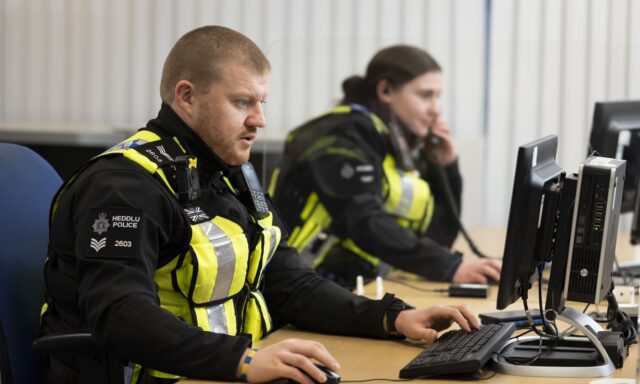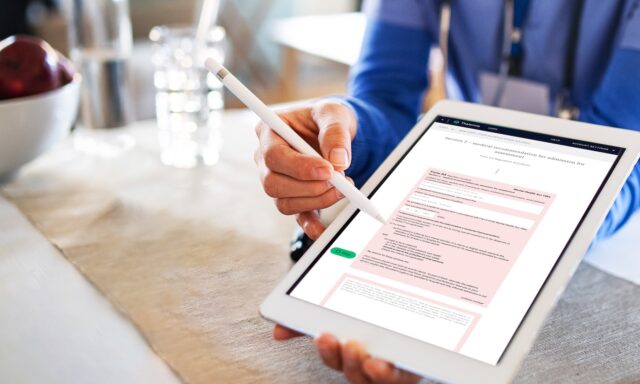Thalamos partners with British Transport Police to transform mental health crisis response across England and Wales
07 May 2025

British Transport Police and Thalamos are joining forces to improve how people in mental health crisis are supported — uniting frontline policing and NHS care through closer collaboration, faster communication and a shared focus on better outcomes.
When British Transport Police (BTP) chose Thalamos to support officers responding to mental health crises, it marked a significant milestone in the evolution of the Thalamos police platform: a national deployment across England and Wales of a digital tool built for real-world impact and cross-sector collaboration.
This isn’t the first time Thalamos has worked with police forces. Our partnership with the Metropolitan Police dates back to 2022. However, Thalamos has learnt a lot about how to best provide for police forces and so recently set out to deliver a step change in what we can provide. This meant bringing together the learnings from the first version of our police platform, direct feedback from the Met, specific requirements from BTP, and a deeper understanding of what NHS partners need to deliver safe, joined-up care.
The result? A smarter, more scalable platform designed to meet the complexities of national policing and improve how officers and NHS professionals manage mental health crises together.
Ahead of phase one of the deployment with BTP, covering pilot sites in Liverpool and Manchester in May 2025 and a subsequent national rollout in July, key Thalamos team members from the product, development and client teams shared their experiences of designing, building and deploying a digital product of this scale and ambition.
A dual-system architecture
“Essentially, this programme means we’re working with every hospital and trust in the country,” explained David Williams, Chief Technology Officer at Thalamos. “That means requiring a system that works nationally, integrates cleanly with NHS organisations, and meets incredibly high standards for data security, isolation and auditability.”
The product has evolved significantly since its original deployment in London. One of the key technical upgrades is a dual-platform architecture: police forces and NHS users access separate systems, connected via robust APIs that ensure the lowest necessary level of data transfer between organisations.
“The police want to retain full control over their data — what’s stored, what’s shared, and how long it’s retained. At the same time, the NHS needs a reliable and consistent handover,” Williams said. “We’ve invested a huge amount of time designing the communication between the two systems to be as smooth, safe and low-friction as possible.”
The upgraded platform also allows for local configuration without losing national consistency. “Each police force can tailor aspects of the platform to their needs, like wording and branding,” they added. “But the core workflows and data fields are standardised, so we can generate joined-up insights across the country.”
“This isn’t about undoing existing work. It is about building alongside it and supporting NHS teams as digital handovers become the norm.”
Designing for officers in motion
“Officers are on the move, often in high-stress situations, and frequently without reliable connectivity,” said Maya Lekkas, Thalamos Product Manager. “That reality shaped every part of how we designed the product.”
Built mobile-first for officers, the new version includes autosave and a simple “share code” feature that allows information to be passed to NHS staff — even without an internet connection. “It’s small features like that which can make a massive difference in critical moments,” Lekkas commented.
The platform upgrade was also influenced by a new ambition: national scale. “Our customers need something that works across regions, in a way that aligned with the existing use of the product too,” Lekkas explained. “We couldn’t just design in isolation — we needed to future-proof this platform for a world where multiple police forces could use it side-by-side.”
Lekkas pointed out that the product needed to harmonise data from voluntary, detained, and Mental Capacity Act scenarios, without overburdening officers. “We had to balance a focus on minimal data input with NHS needs for clinical and legal detail. That meant explaining why certain questions matter — not just technically, but ethically.”
“We’ve rebuilt the technical handover process to make it smoother and more transparent for both police and NHS staff.”
Engaging a fragmented landscape
Delivering for British Transport Police hasn’t just been a technical achievement; it has been a strategic exercise in stakeholder engagement. For Sophie Hadley, Thalamos Programme and Marketing Manager, that’s meant preparing for a phased rollout — starting with a pilot in Liverpool and Manchester, before scaling across England and Wales from July 2025.
“This is a really complex and far-reaching piece of work,” she said. “We’ve had to identify and reach out to NHS trusts based on historical form-sharing data, prioritise high-volume sites, and cascade information through a tiered communications model.”
That model targets senior NHS leaders, operational managers and frontline staff, ensuring that everyone likely to receive a form knows what it is, how it fits into existing processes, and how to act on it. “Our focus has been on getting the right information into the right hands — while being realistic about the challenges of coordinating something at this scale,” Hadley said.
She acknowledged that many NHS organisations have already put significant effort into redesigning their 136 processes. “This isn’t about undoing that work. It’s about working alongside it — ensuring that as digital handovers become more common, we’re supporting NHS teams to continue delivering safe, effective care.”
She’s particularly focused on how the pilot will inform future refinement. “We’ll be checking in with NHS sites as the first forms come through, gathering feedback in real time and using that to improve what we deliver nationally,” Hadley said. “It’s an approach that gives us confidence. We know we’ll learn a lot in the process, and we’re set up to respond quickly and supportively.”
“Officers are on the move, often under pressure and without connectivity. So we built the product to meet them where they are.”
Built on hard-earned experience
The new version of the Thalamos police platform is more than a technical upgrade. It’s the product of everything we have learned about building for police and NHS users — how they work together, where communication breaks down, and what’s needed to fix it.
For Williams, the most significant progress lies in how the product supports effective handover. “We’ve rebuilt the technical handover process to make it smoother and more transparent for both police and NHS staff,” they explained. “It’s been designed from the start to support data sharing that’s minimal, clear, and aligned with each organisation’s governance requirements.”
The infrastructure is now more flexible, too. “Each police force can configure their own version without compromising the national data model,” they added. “It’s designed to scale — and to allow us to report meaningfully on what’s happening across the system, not just within one local area.”
The upgraded Thalamos platform has been built with long-term utility in mind — capable of adapting to future changes in legislation, user feedback and regional practice. “We’re confident we’ve built something far more robust, mobile-ready and interoperable than version one,” Williams said. “And we’ve done it in a way that positions us to support many more partners in the years ahead.”
Laying groundwork for the future
This work represents more than just the deployment of a digital product. It’s a step toward a future where mental health crisis care is consistently supported by real-time, secure and intelligent systems — joining up police and healthcare workflows in ways that reduce risk and improve experience.
For British Transport Police, this is the beginning of a nationwide shift in how digital tools can support officers and safeguard people in crisis. For the NHS, it lays the foundation for clearer, faster communication during high-pressure moments of care.
And for the Metropolitan Police — the first Thalamos policing partner — it marks the continuation of a transformation the police force helped to spark. Its early adoption of the platform, alongside in-depth feedback from officers, provided critical insights into the practical realities of frontline work. That experience shaped how we have upgraded the product to meet the needs of national scale, improved usability and data security: from officer workflows and mobile usability, to governance, security and data architecture.
In many ways, the Met helped prove what was possible — and laid the foundations for what is now a truly national platform.
This rollout with BTP reflects how far the platform has come, but it also reflects something more: the emergence of a new model for collaboration between police and healthcare. One that is informed by experience, designed for real-world complexity, and built to scale.
The upgraded platform is already delivering impact. What it enables next — across policing, mental health and beyond — is even more exciting.
If you’ve found this article valuable then sign up to our monthly mental health briefing newsletter to access future insights.


